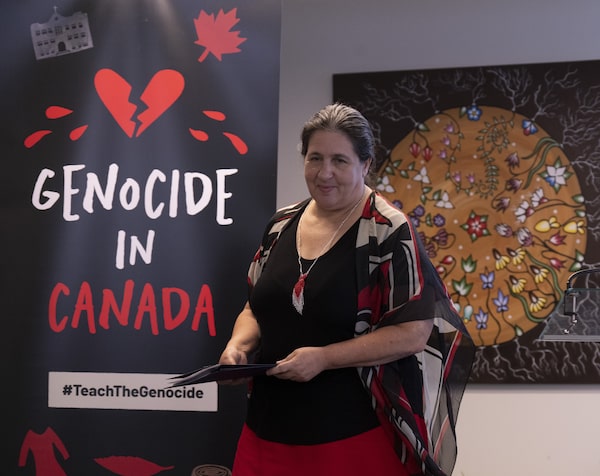
Native Women's Association of Canada chief executive Lynne Groulx takes her seat after speaking during an event launching a graphic guide to genocide, in Ottawa on June 19, 2023.Adrian Wyld/The Canadian Press
The Native Women’s Association of Canada says it has been forced to lay off roughly half its work force due to a major shortfall in federal funding.
The organization – which advocates on behalf of Indigenous women and girls as well as two-spirit, transgender and gender-diverse people – said it received grants totalling $48-million last year as part of Canada’s national apprenticeship program and other initiatives.
This year, revenue dropped to just $10-million, with funding for staff at just $3-million, down from $11-million in 2023, forcing the layoffs of 75 contract and permanent staff members, roughly half its work force.
“We have a genocide on our hands in Canada. It’s daunting every single day,” chief executive Lynne Groulx said in an interview Wednesday.
“We’re here trying to do what we can. It’s not enough – it’s absolutely not enough.”
The organization also had to make cuts at all levels of management and cut back on phone services as well in order to keep operations going. As a result, said Groulx, those operations won’t have the same capacity as previous years.
“It’s an unfortunate readjustment,” said Groulx, both for the organization and the staff members it had no choice but to lay off.
The organization is calling on the federal government to provide more stable core funding to ensure predictability in its advocacy efforts.
President Carol McBride said in a release Thursday that until that happens, their “financial hands are tied” as they do not have enough money to sustain current operations.
“We need some relief and assistance from this dysfunctional funding model that we live in,” said Groulx.
In a joint statement, two federal departments – Indigenous Services Canada and Crown-Indigenous Relations Canada – said they are in discussions with the association about a new funding agreement to replace the current one, which is scheduled to end March 31.
In the meantime, the association said, it has tried to bridge the gaps created between those short-term federal agreements by trying to grow businesses of its own.
That includes a storefront, event spaces and a cafe inside its offices in Gatineau, Que. The group even conducted a feasibility study to explore the idea of building a hotel.
The hotel alone could replace by a factor of three the core funding it gets from the federal government. And while the organization is looking into acquiring land for that project, it is still in the preliminary stages, Groulx said.
“We don’t want to be dependent on the government forever.”
A $100,000 grant was provided to the organization in order to explore the feasibility of the project – an expenditure Groulx said did not have an impact on funding levels for staff or other operations.
In the statement, Indigenous Services said it is unaware of any allegations of misuse of public funds by the association, but also notes any such complaints would have to be directed to the organization itself.
“In keeping with Treasury Board guidelines, routine audits of recipients are a standard and prudent practice in the stewardship of government resources,” the statement reads.
Groulx said she is confident in how her organization handles government funds, citing the annual reports the organization releases each year.